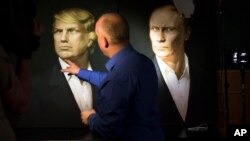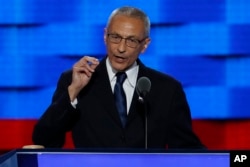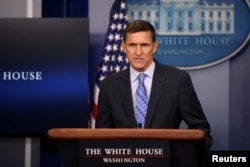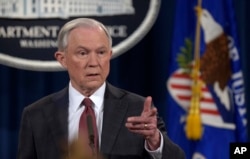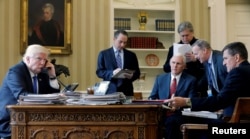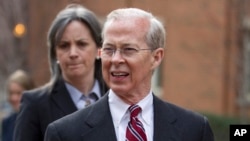Since U.S. intelligence agencies concluded last October that Russia had interfered in the U.S. presidential election, a flurry of news reports and leaks has raised more questions than answers about the growing national controversy.
Weeks before Attorney General Jeff Sessions recused himself from investigations into the matter because of two previously undisclosed meetings with the Russian ambassador to Washington, Sergey Kislyak, during the 2016 presidential campaign, law enforcement and lawmakers began looking into the allegations.
FBI
The FBI is leading at least three separate investigations into allegations of Russian interference in the election and possible Russia-Trump connections, Reuters reported last month, citing unnamed current and former government officials:
* The FBI's Pittsburgh field office, which is in charge of cybersecurity investigations, is seeking to identify the people who breached the Democratic National Committee's computer systems last year.
* The bureau's San Francisco office is trying to identify the people suspected of being behind the "Guccifer 2" online handle, which posted stolen emails of Democratic presidential candidate Hillary Clinton's campaign manager, John Podesta.
* FBI counter-intelligence agents in Washington are looking into leads from informants and foreign communication intercepts.
In what may have been a fourth FBI inquiry related to Russia and Trump, the bureau investigated a series of conversations that former National Security Adviser Michael Flynn had with Kislyak but did not disclose to Vice President Mike Pence, leading to Flynn's resignation on Feb. 14.
Congress
In Congress, meanwhile, at least five standing committees and one subcommittee are in various stages of investigations into Russian interference in the U.S. election and reported contacts between Trump associates and Russian officials. Among them:
* The Senate Intelligence Committee, with jurisdiction over 17 intelligence agencies, is in the early stages of a probe launched in January. Initially focused on Russian hacking and misinformation efforts during the election, it has since been broadened to cover what committee members have described as contacts between Russian officials and the U.S. political campaigns.
* The Senate Judiciary Committee, with oversight over the Department of Justice and the FBI, is carrying out its own investigation and has asked the Department of Justice for a briefing and documents related to circumstances leading up to Flynn's resignation.
* The Senate Judiciary Subcommittee on Crime and Terrorism, chaired by Russia hawk Lindsey Graham, announced in early February plans to investigate Russian meddling. The panel has jurisdiction over the Criminal Division of the Department of Justice, as well as the FBI.
* The House Intelligence Committee, charged with oversight of 17 intelligence agencies, is investigating "intelligence or counter-intelligence issues" involving Russia and the election.
* The House Judiciary Committee, with oversight over the Department of Justice, is conducting its own investigation, with Republican members planning to write a letter to Attorney General Sessions requesting his cooperation with the Russia probe.
* The House Oversight and Government Reform Committee, the Congress's main investigative committee with government-wide oversight jurisdiction, is looking into leaks of classified information about Flynn and his contacts with Russia and has sent a letter to Leading Authorities, a speakers bureau, to inquire whether Flynn received any payment from the Russian government for an appearance at a Moscow gala in 2015.
Other Congressional committees such as the Senate Armed Services Committee and the Senate Foreign Relations Committee held hearings about the Russian hacking allegations last summer. Senator John McCain, Chairman of the Armed Services Committee, wrote to the White House last month seeking information about Flynn's contacts with Russia.
But of all of the Congressional probes, perhaps the most consequential is being led by the Senate Intelligence Committee, the panel responsible for such high-profile investigations as the inquiries into the CIA's controversial torture practices in 2014 and the 2012 militant attacks on two U.S. government facilities in Benghazi, Libya.
Not only does the committee have the widest jurisdiction over intelligence matters with staff and resources to investigate them, but the committee's investigation into the Russian interference enjoys the support of its ranking Democratic member, Mark Warner, even as other Republican-led congressional investigations have been criticized by Democrats as partisan.
Options regarding investigations
Andrew Kent, a professor at Fordham Law School in New York who has written extensively about the investigations into Trump and Russia, said the FBI and congressional committees are focused on different aspects of the suspected Trump-Russia connections.
"The FBI focus is going to be at looking at whether any federal laws were broken," Kent said. "The congressional committees can look a little bit more broadly and don't have a focus on whether specific laws were broken."
While none of the investigations is truly independent, Kent said, there are at least four options to carry out such a probe: a congressional select committee with joint Republican-Democratic control; a congressionally-created bipartisan commission similar to the 9/11 panel; a special prosecutor; or an independent counsel with the full delegated power of the attorney general.
But given White House opposition and Republican control of Congress, he said none of the options seem likely at the moment.
Richard Ben-Veniste, the former chief of the Watergate Task Force that investigated former President Richard Nixon in the 1970s, said Sessions should hand over control of the investigations to Acting Attorney General Dana Boente, who is a career prosecutor.
Boente is "an experienced prosecutor and far more likely to be deemed credible in terms of supervising the investigation," Ben-Veniste said.
Another candidate would be Rod J. Rosenstein, a career prosecutor and the current U.S. Attorney for the District of Maryland, who has been nominated by Trump as deputy attorney general. A confirmation hearing has been set for March 7.
"Senators will obviously have lots of questions for him about Trump-Russia issues," Kent said.
In Congress, while Republicans have roundly rejected Democratic calls for a select committee to investigate any Russia-Trump connections, the idea is likely to gain traction as new information comes to light, Kent said.
With the extent of the Trump campaign's ties to Russia unknown, Ben-Veniste said it is too early to say that the Russia questions will lead to a Watergate-style inquiry. However, he said he saw one parallel between the two high-stakes scandals.
"Historically we've seen similar circumstances where the party, in protecting its reputation, has said that it is unnecessary to create any special investigative apparatus to ensure the public of the integrity of the investigation," he said. "Each time those initial protests are overcome and a special investigation takes place, it has been shown that there is fire behind the smoke."




